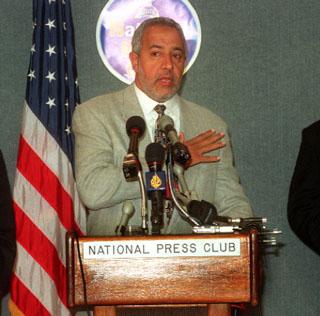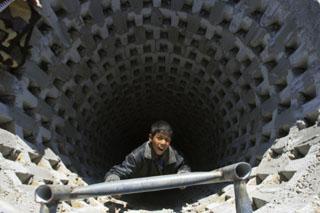The Israeli-Hamas conflict, with its evocative images of human suffering, has engaged the hearts and minds of people the world over. Indeed, the death of any innocent – Israeli or Palestinian – is a tragedy, and no one can fail to be moved by the human suffering and the humanitarian crisis in Gaza.
But the immediate cessation of violence that was declared over the weekend – and that has so far held – may not endure. If we want to prevent further tragedies, it is important to go beyond the “fog of war” – to go behind the daily headlines that cloud understanding and the cliches (the “cycle of violence”) that corrupt it – and ask some fundamental questions about the root causes of this war and the basis for its resolution.
1. Do you agree that Israel, like any other state, has the right to live in peace and security, free from any threats or acts of force?
2. Are you aware that Hamas has launched over 8,000 missiles, rockets and mortars from behind civilian areas, deliberately targeting and terrorizing the Israeli civilian population these last three years, constituting an armed attack prohibited by the UN Charter? Are you aware that despite a six-month truce, Hamas launched close to 3,000 armed attacks in 2008 alone?
3. Do you agree that Israel – like any other state – has an obligation to protect its citizens, and a right to self-defence against armed attack as set forth in Article 51 of the UN Charter? As then-U.S. secretary of state Condoleezza Rice put it to the UN Security Council, echoing the words of both U.S. President Barack Obama and German Chancellor Angela Merkel: “The situation before the current events in Gaza was clearly not sustainable. Hundreds of thousands of Israelis lived under the daily threat of rocket attack, and frankly, no country, none of our countries, would have been willing to tolerate such a circumstance.”
4. Do you agree that Israel’s exercise of self-defence must comport with the principles of international humanitarian law, including the principle of proportionality and the prohibition against the infliction of unnecessary suffering?
5. Do you agree that Palestinians in Gaza have the same right as Israelis to live in peace and security? Are you aware of the domestic repression by Hamas of Palestinian rights in Gaza, including converting the civilian infrastructure to a weapons depot and exploiting the civilian population as human shields, as is now being observed even in the Arab press?
6. Do you agree that the ceasefire must be durable and sustaining to protect the peace and security of both Israelis and Palestinians? If so, then let us look deeper at what this conflict is truly about.
7. Are you aware that the border crossings – between Egypt and Gaza, and between Gaza and Israel – have been used to smuggle terrorists, weapons, munitions and contraband, when they should be open instead for the movement of people and trade, as set forth in the 2005 Israeli-Palestinian Agreement on Movement and Access?
8. Are you aware that Hamas is designated a terrorist entity by Canada, the United States and the European Union, and that UN Security Council resolutions require Palestinian governing authorities to deny safe havens to terrorists?
9. Are you aware that the Hamas charter calls for the destruction of Israel and the killing of Jews wherever they might be?
10. Are you aware that this genocidal ideology is shared not only by Hamas but also by Iran and its proxy immediately north of Israel, Hezbollah. Did you know that Iran is training, financing, supplying and instigating terrorist action by Hamas and Hezbollah to carry out this existential threat to Israel?
11. Are you aware that Hamas – not only during the present hostilities, but before them, too – has propagated a state-sanctioned culture of hate, in the mosques, in the schools, in the broadcasting system and in the summer camps and training camps, which teaches that Jews are inherently evil, a cancer, responsible for all the evils of the world, the sons of apes and pigs and the defilers of Islam?
12. Do you agree that such statements promote hatred and contempt for Jews, and constitute an obstacle to peace? The next generation of Palestinians must be one that is capable of keeping the peace with Israel. It is in the interests of neither Israelis nor Palestinians themselves to perpetuate this false “conflict of civilizations” – and yet perpetual conflict is exactly what Hamas, by its own acknowledgment, wants, until Israel’s demise. So then, a final question:
13. Do you agree that a comprehensive and enduring ceasefire must include: the reaffirmation – as a bottom-line commitment, as President Obama has put it – of Israel’s right to live in peace; the cessation of all acts of terror and violence against Israeli civilians, the casus belli of these hostilities; the withdrawal of Israel from Gaza; the establishment of an international protection and stabilization force to enforce the ceasefire and protect against smuggling and the manufacture of weapons; the deployment of a massive humanitarian undertaking to ensure assistance reaches those in need; the opening of border crossings; the initiation of a comprehensive program for the reconstruction of Gaza and the rehabilitation of its citizens; and the freeing of Palestinian society from the cynical and oppressive culture of hate and incitement fuelled by Hamas?
I close on a personal note. I write not only as a law professor and MP, but as one who has family in Israel and friends in Palestine, and who has lived and worked in the region and been engaged in the struggle for peace for more than 35 years.
The overriding truth of these past 35 years for me has always been clear and remains the same. I will stand with those who support the right of peoples in the Middle East – Israelis and Palestinians alike – to live in peace and security, free from any threats or acts of force, a cornerstone of UN principle and Canadian foreign policy; and I will oppose all those, like Hamas and its patron Iran, who seek the destruction of any people or state in violation of the UN Charter and all civilized norms.
Prof.Irwin Cotler; Faculty of Law, McGill University; Member of the Canadian Parliament, Former Canadian Minister of Justice
Published in the NATIONAL POST of Canada: January 22, 2009
http://network.nationalpost.com/np/blogs/fullcomment/archive/2009/01/22/newholder1.aspx








